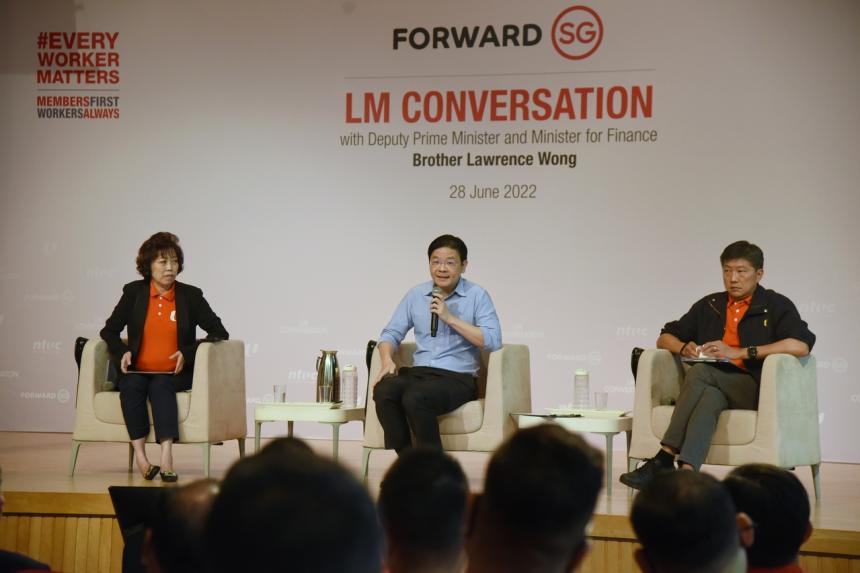SINGAPORE - As Singapore moves to refresh and strengthen its social compact by investing in greater assurance and protection for vulnerable segments of society, it needs to confront the question of how far society as a whole is willing to go, said Deputy Prime Minister Lawrence Wong on Tuesday (June 28).
This means society, including the broad middle, has to decide how much more it is willing to pay in taxes to fund these programmes, added Mr Wong, who is also Finance Minister.
"Do we want to go as far as the Europeans, where tax rates are very high - personal income tax rates are more than 40 per cent at the top end, and for the middle-income, it is easily over 30 per cent?" he asked.
DPM Wong noted that in Europe, the goods and services tax (GST) is "also easily more than 20 per cent".
"If we say no, that's a bit too far, then how far should we go?" he asked.
The minister was responding to a question from National Trades Union Congress president Mary Liew during a dialogue with union leaders at the launch of the Forward Singapore exercise.
The topic of higher taxes for more welfare was a divisive one at the dialogue, according to a poll conducted at the event.
Fewer than half of the respondents - 45 per cent - said they were willing to pay more taxes if this allows the Government to better provide for Singaporeans in need.
Another 26 per cent said they were not willing to do so, while 29 per cent were undecided. Singapore's GST is set to be increased from 7 per cent currently to 8 per cent next year and to 9 per cent in 2024.
Ms Liew had shared an anecdote about a Norwegian acquaintance who told her he was happy to contribute almost two-thirds of his income to taxes as he felt it was the people's responsibility to look out for the less fortunate. She asked Mr Wong when Singapore might reach that stage.
Mr Wong said this was an enlightened way of thinking, as investing in more protection gives people greater confidence to embark on their future.
But it boils down to implementation and details, such as whether additional resources collected for greater social welfare result in a more tight-knit society and a stronger social compact.
Labour chief Ng Chee Meng, who also spoke at the dialogue, said the Scandinavian approach to welfare and taxation is not without its downsides, and there is a trade-off between welfare and a society's dynamism.
"We have to consider whether the overall pie will grow if we go into a mode like the Scandinavian type of welfare. Will it reduce our business partners' drive to create better businesses and our workers' own initiative in forging a better life?" said Mr Ng.
Mr Wong said a balance needs to be struck when implementing social welfare policies so that the end result is not society becoming worse off.
"If we want to spend more, how do we pay for it? If you get overly generous on social welfare, would it create disincentives to work and bring about a less dynamic and innovative economy?" he asked.
Likewise, while the Government wants workers to be paid more, the implications have to be thought through, such as when it comes to small and medium-sized enterprises already struggling to stay afloat. Pushing things too far can cause more problems for the whole economy, he added.
While there are no easy answers, the bottom line is to keep the economy growing while ensuring that the fruits of economic growth are shared widely by all Singaporeans, said Mr Wong.
During the dialogue on Tuesday, a union member said he was not comfortable paying higher income tax but would be prepared to contribute more to his own Central Provident Fund (CPF) accounts instead. Some of the interest earned could be diverted into national wage support schemes like Workfare, he suggested.
In response, Mr Ng noted that CPF contributions are "personal gains" that come with 2.5 per cent to 6 per cent interest, depending on the CPF account the funds go to.
But for every tax dollar collected, middle-class taxpayers here get back $2 in benefits, while those in the lower-income bracket get back $4 in benefits, Mr Ng said.

